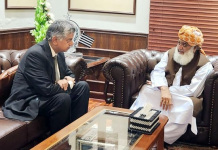
ISLAMABAD, Jan 24 (APP): The Indian state appeared as the largest violator of human rights which are guaranteed in the Universal Declaration of Human Rights (UDHR).
According to human rights experts, from genocide in the Indian Illegally Occupied Jammu and Kashmir (IIOJK) to victimization of religious minorities, India had become an apartheid state where human rights and “equality” were extinct values.
Due to such pathetic record and the prevalent human rights violations in India, the Office of the High Commissioner for Human Rights (OHCHR) Complaints procedure Branch, issued a communication to India.
It expressed its concern on the trafficking in persons (Prevention, Care and Rehabilitation) Bill 2021 and its compliance with the state obligations under international law to prevent trafficking in persons, assist and protect trafficked persons without discrimination, ensuring gender equality and promoting the human rights of trafficked persons. According to complaint procedure, the same would be published in United Nations High Commissioner of Human Right’s report for the next session.
This communication was made public on the UNHRC website and the same would be highlighted during the next session of UNHRC. These issues will also be highlighted during the Universal Periodic Review (UPR) of India which is scheduled in July 2022 and would be discussed in 54th Session of UNHRC.
The OHCHR had reminded the Indian government that Article 39 CRC provided that recovery and reintegration of child should take place in an environment, which fostered the health, self-respect and dignity of the child victim.
The committee on the Rights of the Child, in its general comment No.6 (2005) on treatment of unaccompanied and separated children outside their country of origin, stated that ‘children should not be deprived of their liberty and that detention cannot be justified solely on the basis of the child being unaccompanied or separated, or on their migratory or residence status or lack thereof’.
It laid stress that trafficked persons should not be held in detention facilities or any other forms of custody under any circumstances and led to violation of the right to be free from arbitrary arrest and detention, protected under the International Covenant on Civil and Political Rights.
The US State Department in its ‘2021 Trafficking in Persons Report: India’ highlighted that the Indian government did not meet universal standards to curb the human trafficking in different forms.
“The government achieved fewer convictions, and the acquittal rate for traffickers remained high at 73 percent. Official complicity in trafficking remained a concern; the government did not report any prosecutions or convictions. Although law enforcement increased victim identifications, they identified disproportionately few victims compared with the scope of the problem, with some organizations estimating eight million trafficking victims in India,” the report further said.
The State department report said that efforts to audit government-run or -funded shelters remained inadequate, and significant shortcomings in protections for victims, especially children, remain unaddressed.
Many victims waited years to receive central-government mandated compensation, and often state and district legal offices did not proactively request the compensation or assist victims in filing applications. Some foreign trafficking victims remained in state-run shelters for years due to lengthy or non-existent repatriation processes, it added
The experts urged the US and the European Union to step in for the protection of human rights of the Indian minorities and Kashmiris in IIOJ&K. Humanity must not be subservient to the mere economic gains, they added.